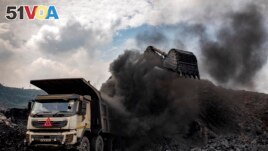A United Nations report warns that pollution is leading to more early deaths around the world than the COVID-19 pandemic.
A U.N. environmental report says: “Pollution and toxic substances cause at least 9 million premature deaths, double the number of deaths inflicted by the COVID-19 pandemic during its first 18 months.”
The U.N. blames pollution released by nations and by companies. The report called for "immediate and ambitious action" to ban some toxic chemicals.

FILE - Coal is loaded into a truck at an open-cast mine near Dhanbad, an eastern Indian city in Jharkhand state, Sept. 24, 2021. (AP Photo/Altaf Qadri)
Results from the report will be presented to the U.N. Human Rights Council when it meets next month.
U.N. Special Rapporteur on human rights David Boyd released the report Tuesday. He said that the ways nations are dealing with “the risks posed by pollution and toxic substances are clearly failing, resulting in widespread violations of the right to a clean, healthy and sustainable environment.”
Last October, the U.N. Human Rights Council voted to recognize the right to a safe, clean, healthy and sustainable environment as a basic human right. The resolution, which has no legal force, adds to the list of rights that the U.N. considers basic human rights.
The report said pollution from pesticides, plastics and electronic waste is causing widespread human rights violations. Pesticides are chemicals used to kill insects that damage plants or crops.
The report also said pollution causes at least 9 million people around the world to die early, or prematurely, each year. The coronavirus is blamed for about 5.9 million deaths.
The report urges a ban on polyfluoroalkyl, a manufactured substance used in household products such as cookware. The substance has been linked to cancer. It is considered a "forever chemical" because it does not break down easily in the environment.
The report also calls for the clean-up of polluted places. In extreme cases, it urges moving affected communities. These include poor and indigenous groups living in what the report calls "sacrifice zones".
That term was first used to describe nuclear test areas where people could no longer live. Its meaning was expanded in the report to include any highly polluted place or a place where people can no longer live because of climate change.
U.N. human rights chief Michelle Bachelet has called environmental threats the biggest global rights problem. Environmental activists are increasingly using human rights laws in climate and environmental cases.
I’m Mario Ritter Jr.
Emma Farge reported this story for Reuters. Mario Ritter Jr. adapted it for VOA Learning English.
________________________________________________________________
Words in This Story
toxic –adj. containing poisonous substances
inflict –v. to cause someone to be affected by something (usually bad or harmful)
ambitious –adj. having a desire to have power or influence
pose –v. to be or create; to present something
sustainable –adj. able to be used without being completely used up or destroyed
indigenous –adj. produced, living or existing in a certain place or environment
global –adj. involving the entire world
We want to hear from you. Write to us in the Comments section, and visit 51VOA.COM.
